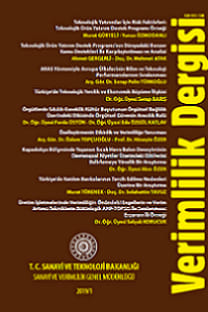Çağrı merkezlerinde işgücü yönetimi için bir simülasyon çalışması
İş yükü tahminleri, kaynak temini, personel alımı, vardiya planlama, personel ata- ma ve çağrı yönlendirme problemleri, çağrı merkezlerinde geleneksel işgücü yö- netimi problemleridir. Bu problemlerin çözümü için genellikle kullanılan modeller Erlang-C ve simülasyon modelleridir. Günümüz rekabet koşulları, gelişen teknolo- ji, müşteri ihtiyaçları sayesinde çağrı merkezleri çok işlevli ve karmaşık bir hale gel- miştir. Bundan dolayı çağrı merkezlerinin geleneksel anlamda karşılaştığı problem- leri çözmek için kullandıkları modeller geçerliliklerini yitirmeye başlamıştır. Özellik- le Erlang-C modelleri, kısıtları ve varsayımları nedeniyle geçerliliğini yitirmiştir. Bun- dan dolayı güçlü bir analiz aracı olan simülasyon popüler hale gelmektedir. Bu çalışmada bir çağrı merkezinin farklı çağrı yönlendirme alternatifleri ile nasıl bir performans sergileyeceğini analiz edebilmek için bir simülasyon modeli geliş- tirilmiştir. Bu alternatif sistemlerden en iyisini belirlemek için önemli faktörler olan servis seviyesi, verimlilik ve maliyetler göz önüne alınarak karşılaştırmalı analizler yapılmıştır.
Anahtar Kelimeler:
-
A simulation study for workforce management in call centers
Workload predictions, personnel recruitment, shift scheduling, forming rosters and call routing problems are the traditional workforce management problems in call centers. The models which are usually used to solve these problems are Erlang-C and simulation models. Today call centers has become more complex and multi functional because of the competitive conditions, technology developments and customer needs. For this reason, models which are used to solve these traditional problems in call centers have begun to lose their validity. Especially Erlang-C mo dels had lost their validity because of their assumptions and constraints. For this re- ason, simulation has become more popular as a powerful analysis tool. In this study, a simulation model was developed to determine how a call center performs through different call routing alternatives. By considering some impor- tant factors such as service level, utilization, and costs, comparative analyseis have been made to determine the best of these alternatives.
Keywords:
-,
___
- 1. AKSIN et al., 2007, The Modern Call Center A Multi-Disciplinary Perspective on Operations Management Research, Production And Operations Management Vol. 16, No. 6, November-December 2007, pp. 665-688
- 2. AVRAMIDIS et a I., 2009, Optimizing Daily Agent Scheduling in a Multis-kill Call Center, European Journal of Operational Research, Article in Press
- 3. BABAT, V., PRUITTE, Jr. Eddie B., 1998, Using simulation in call centers, Proceedings of the 1998 Winter Simulation Conference, D.J. Medeiros, E.F. Watson, J.S. Carson and M.S. Manivannan, eds. Pp.1395-1399
- 4. Çağrı Merkezleri Derneği, 2009, Dünya ve Türkiye Çağrı Merkezi Sektörü, http://www.cagrimerkezleridernegi.org/index.php/sektorumuz/browse/ sunumlar/ 5. GANS, N., KOOLE, G., MANDELBAUM, A., 2003, Telephone call centers:Tutorial, review and research prospects, Manufacturing and Service Operations Management 5(2) 79-141
- 6. GARNETT, O., A. MANDELBAUM, M. REIMAN, 2002, Designing a call center with impatient customers, Manufacturing and Service Operations Management 4(3) 208-227
- 7. KLUNGLE, R.1999, Simulation Of A Claims Call Center: A Success And A Failure, Proceedings of the 1999 Winter Simulation Conferenc. D.J. Medeiros, E.F. Watson, J.S. Carson and M.S. Manivannan, edsp.1648-1653
- 8. KOOLE, G.2007, Call Center Mathematics-A scientific method for understanding and improving contact centers, http://www.math.vu.nl/~koole/ ccmath/book.pdf 9. KOOLE, G., A. Pot., 2006, An overview of routing and staffing algorithms in multi-skill customer contact centers, Technical Report, Department of Mathematics, Vrije Universiteit Amsterdam, The Netherlands
- 10. MANDELBAUM, A., S. ZELTYN, 2006, Service-engineering of call centers: Research, teaching, practice, IBM Business Optimization and Operations Research Workshop, Haifa, Israel
- 11. MEHROTRA, V., J. FAMA, 2003, Call center simulation modeling: Methods, challenges, and opportunities in Proceedings of the 35th conference on Winter Simulation, New Orleans, LA, S. Chick, P. J. S_anchez, D. Ferrin, D. J. Morrice (eds.), 1,135-143
- 12. STECKLEY, S. G., S. G. HENDERSON, V. MEHROTRA. 2009. Forecast errors in service systems. Probability in the Engineering and Information Sciences, 23:305-332
- 13. ZELTYN, S., A. MANDELBAUM. 2005. Call centers with impatient customers: Many-servers asymptotics of the m/m/n_g queue. Queueing Systems: Theory and Applications 51 (3- 4) 361 -402
- ISSN: 1013-1388
- Başlangıç: 2004
- Yayıncı: T.C. SANAYİ VE TEKNOLOJİ BAKANLIĞI STRATEJİK ARAŞTIRMALAR VE VERİMLİLİK GENEL MÜDÜRLÜĞÜ
Sayıdaki Diğer Makaleler
Farklı bir Ülke, farklı bir kültür: kültür şoku (kültürlerarası adaptasyonun sağlanması)
Çağrı merkezlerinde işgücü yönetimi için bir simülasyon çalışması
Bülent SEZEN, Semih Ediz ERDAŞ
Yükseköğrenim yapılarında eğitim donanımı tasarımına yönelik antropometrik ölçülerin belirlenmesi
Velittin KALINKARA, H. Erdem ÇOLAKOĞLU, Gökçe ERTURAN, Hande GÜNGÖR
